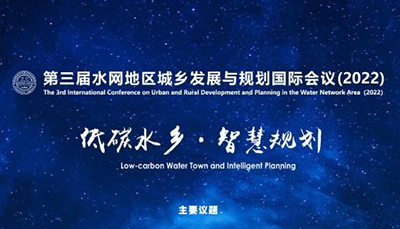


During November12-13th, The 3rd International Conference on Urban and Rural Development and Planning in Water Network Areas (2022) was successfully held, which is hosted by Urban Planning Society of China (UPSC) and Suzhou University of Science and Technology, organized by School of Architecture and Urban Planning and Suzhou University of Science and Technology and co-organized by Suzhou Planning and Design Institute Co., LTD. Zhou Lan, Vice President of UPSC and Director of Jiangsu Provincial Department of Housing and Urban Rural Development,delivered a keynote report entitled "To Rebuild the Harmonious and Symbiosis between Man and Nature - Urban Landscape Practice and International Consensus in Watertown Jiangsu".
Keynote speaker: Zhou Lan, Vice President of UPSC and Director of Jiangsu Provincial Department of Housing and Urban Rural Development, researcher-level planner
1 The development course and continuous action of water environment governance in Jiangsu Province
Small bridge, creek and somebody else are the typical images of Jiangsu province in the period of agricultural civilization. But after the rapid industrialization and urbanization ,water environment has been affected, and Blue-green algae pollution incident in Tai Lake happened in 2007. Since then, Jiangsu has embarked on a sustained campaign to clean up the water environment: for the policy, Jiangsu Province has promulgated the Regulations on the Prevention and Control of Water Pollution around the Tai lake in Jiangsu Province, raising environmental standards and industry thresholds and promoting the ecological transformation in production and lifestyle; for the funds, from 2007-2021, 32 billion yuan was specially and provincially allocated to Tai Lake for the governance and 250 billion yuan in financial and social fund was allocated from the municipal governments along Tai Lake. For the technology, city sewage treatment factories are improved and renovated and the infrastructure capacity across the river basin has led to a qualitative leap. The inter-city information system of water environmental governance is established to further realize the dynamic management of the operation of the environmental infrastructure. With the unremitting efforts, Jiangsu's water environment governance has achieved remarkable phased results: the trend of eutrophication in Tai Lake has been effectively curbed against the background of more than twice the total economic growth and 18 million population growth, and ammonia nitrogen and total nitrogen, the two core indicators of water quality in Tai Lake, have been improved by two grades, and the potassium permanganate index and total phosphorus have been improved by one grade, Meanwhile the water environment quality and environmental infrastructure capacity of the province have also been greatly improved.
2 Jiangsu proposal for urban landscape greening in the new development stage
Based on the improvement of water environment, Jiangsu attaches importance to the waterfront linkage system to improve the living environment. In view of the characteristics of the province with high development intensity and great resource and environment constraints, Jiangsu actively explores ways to improve the human settlement environment and sustainable development under the high-density background. In May 2021, the Provincial Department of Housing and Urban Rural Development, together with the Publicity Department of the Provincial Party Committee, the Chinese Society of Landscape Architecture, the Chinese Architectural Society, the Chinese Park Association and others, jointly launched the Jiangsu Initiative for Urban Landscape Greening in the New Development Stage, which focuses on three functions of garden green: the first is green and low-carbon ecological functions. The contents include preparing multi-dimensional ecological green network, expanding green carbon sink space, improving waterfront ecological quality, protecting biodiversity, building green sponge, and building natural gardens. The second is the social function of pluralism and sharing. The contents include making green space a convenient and accessible living space for residents, making parks an interesting and dynamic space, making green ways an experience space close to nature, expanding the healthy space in the post epidemic era, improving the safe space for urban disaster prevention and emergency response, making green space boundless and green sharing. The last is the poetic and beautiful humanistic function. The content includes carrying forward garden art in inheritance and innovation, making street trees add urban space features, connecting the city's beautiful living room with green, making garden greening show the changing landscape of the four seasons, making plants and flowers enter thousands of households, and letting us guard green and nature with heart.
The 2021 Jiangsu Initiative has promoted the garden industry and social consensus. Based on the proposal, the provincial government has included the construction of Happy Gardens into one of the 50 practical things for people's livelihood in 2022. All localities have actively responded to the proposal and seriously promoted the construction of Happy Gardens, which has produced positive phased results. For example, Nanjing has built more than 1377 kilometers of green ways, Suzhou has built 100 pocket parks, and Wuxi has built a number of high-quality featured theme parks.
3. The Modern International Consensus on the Harmonious Coexistence between Man and Nature
The report of the 20th National Congress of the Communist Party of China clearly pointed out that Chinese path to modernization is a modernization in which people and nature coexist in harmony. In order to implement the spirit of the 20th National Congress of the Communist Party of China and respond to the theme of 2022 World City Day, Act Local to Go Global, we actively promote the development of the Jiangsu Initiative on Urban Landscaping in the New Development Stage (2021) into an international consensus. In November this year, at the 2022 International Conference on Green Innovation and Development of Cities and Towns, the Provincial Department of Housing and Urban Rural Development, together with the Provincial Foreign Affairs Office, the Chinese Society of Landscape Architecture, the Chinese Architectural Society, the Chinese Park Association and others, jointly launched the Building a Green, Healthy and Humanistic Urban Home-Jiangsu Consensus (2022).
The consensus is further condensed into nine core contents in three aspects. Focusing on green homes, we should promote (1) ecological restoration to create a good habitat, (2) organic connection between cities and nature, and (3) benign interaction between people and nature; focusing on healthy homes, we should promote (4) making natural scenery a living place, (5) improving urban safety and resilience with green space flexibility, and (6) expanding healthy space to heal urban life; focusing on the humanistic homeland, we should promote (7) going out of the home to enjoy green life, (8) public participation in building a beautiful space, (9) creating a poetic garden landscape.
4.Conclusions
This report focuses on the synergy between Jiangsu's water environment governance action and urban landscaping practice, as well as Jiangsu's initiative and international consensus based on Jiangsu's action and practice. The content and direction of the discussion are highly consistent with the theme of this conference, Low-carbon Water Town · Intelligent Planning, which aims to promote the international cooperation of harmonious coexistence between people and nature, promote the reshaping of the partnership among people, cities and nature, and make people greener, healthier The future home of humanity.
From: UPSC
Source:http://www.planning.org.cn/news/view?id=13375&cid=13
Translated by: Yue Wang